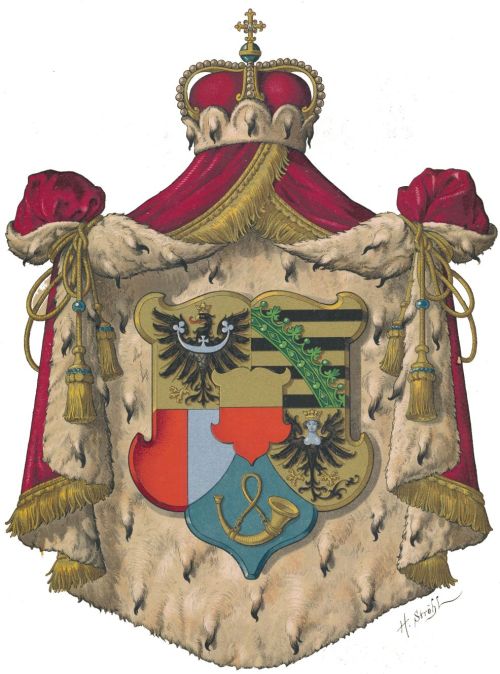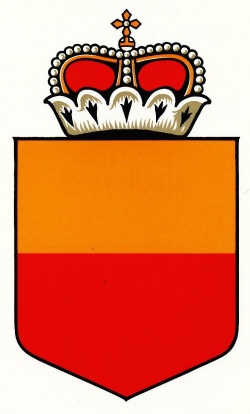National Arms of Liechtenstein
| Heraldry of the World Civic heraldry of Liechtenstein |
NATIONAL ARMS OF LIECHTENSTEIN
Official blazon
Der Wappenschild des grossen Staatswappens ist geviert mit unten eingepfropfter Spitze und belegt mit von Gold und Rot geteiltem Herzschild.
- Feld 1: In Gold ein mit kreuzbesetztem silbernen Kleeblattmond belegter gekrönter schwarzer Adler.
- Feld 2: Von Gold und Schwarz achtmal gestreift, mit grünem Rautenkranz belegt.
- Feld 3: Von Rot und Silber gespalten.
- Feld 4: In Gold ein gekrönter, gold-bewehrter schwarzer Jungfernadler mit silbernem Kopf.
In der blauen Spitze ein goldenes Jagdhorn an gleichfarbiger Schnur.
Den Schild umgibt ein mit dem Fürstenhut gekrönter Fürstenmantel (Wappenmantel), von Purpur und innen mit Hermelin gefüttert.
Origin/meaning
The arms are in use as such since 1630 and were officially granted on June 4, 1957.
The national arms are the arms of the reigning Royal family. The arms are a combination of the arms of the Duchy of Silezia (eagle, now in Poland), the Kuenring dynasty (second quarter), the Duchy of Troppau (third quarter, now Opava in the Czech Republic), East-Frisia (fourth quarter, it is in the North-West corner of Germany, see also Emden), the horn of the Duchy of Jägerndorf (now Krnov in the Czech Republic) and as an escutcheon the arms of the family of Liechtenstein proper.
As small arms, only the escutcheon is used, with the Ducal crown.
Contact and Support
Partners:
Your logo here ?
Contact us
© since 1995, Heraldry of the World, Ralf Hartemink 
Index of the site
Literature : Information from : Robert Young












